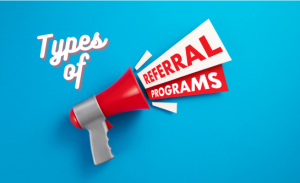Select the Right Referral Program: A Guide to Business Success
 Apr 11th, 2024
Apr 11th, 2024
 495 views
4 MINS READ
495 views
4 MINS READ

In the bustling landscape of modern business, where 92% consumers trust the suggestions and reviews from acquaintances, referral programs stand as pillars of growth and success. However, with various types of referral programs to choose from, selecting the most suitable one for your business can be a daunting task. In this blog post, we’ll explore different referral program types and guide you through selecting the right one for your business.
Understanding Referral Programs
Before delving into the different types of referral programs, let’s first understand what a referral program entails. A referral program is a structured system that incentivizes existing customers to refer new customers to a business. These incentives could range from discounts, free products or services, to cash rewards.
The primary objective of a referral program is to capitalize on the trust and credibility that existing customers have with their networks. People are more likely to try a product or service recommended by someone they know and trust. A recent research found that the conversion rate of referred customers is 30% higher than other sources of customers, making referrals a powerful tool for acquiring high-quality leads.
Now that we’ve explored the different types of referral programs, how do you determine which one is most suitable for your business? Here are some factors to consider:
Types of Referral Programs
1. Discount or Credit-Based Referral Programs
In this type of program, existing customers receive discounts or credits for each successful referral they make. The referred customer also receives a discount on their first purchase. This type of referral program is popular among e-commerce businesses and subscription-based services.
2. Cash or Monetary Referral Programs
Similar to discount-based programs, cash referral programs offer monetary rewards to both the referrer and the referred customer. The incentive is usually a fixed amount or a percentage of the referred customer’s first purchase. This type of program is effective in industries where customers have a high lifetime value, such as financial services or B2B software.
3. Points-Based Referral Programs
Points-based referral programs reward customers with points for each successful referral. These points can be redeemed for various rewards, such as discounts, free products, or exclusive perks. Points-based programs are versatile and can be adapted to suit different business models and industries. If your business aligns with this type, you could consider utilizing ezLoyalty, a simple and effortlessly developed and implemented effective points-based referral program.
4. Tiered Referral Programs
Tiered referral programs incentivize customers to make multiple referrals by offering escalating rewards for reaching certain milestones. For example, customers may receive increasing discounts or bonuses for every three successful referrals they make. Tiered programs encourage ongoing participation and can generate a snowball effect as customers strive to unlock higher rewards.
5. Charity or Social Cause Referral Programs
In this type of program, businesses donate a portion of their revenue or profits to a charitable cause for each successful referral. Customers are motivated to participate not only by the incentive offered but also by the opportunity to contribute to a worthy cause. Charity referral programs can enhance brand reputation and foster a sense of social responsibility among customers.
How to choose the right referral program for your business?

Choosing the right referral program for your business requires careful consideration of your target audience, industry, and marketing objectives. Here are some key factors to keep in mind:
- Audience Persona: Understand your target audience’s preferences, behavior, and communication channels to determine which type of referral program is most likely to resonate with them.
- Budget and Resources: Consider your budgetary constraints and available resources for implementing and managing a referral program. Some programs may require more extensive tracking and administration than others.
- Business Model: Consider your business model and how referrals fit into your overall marketing strategy. For example, if you operate a subscription-based service, a discount-based referral program may align well with your recurring revenue model.
- Customer Lifetime Value (CLV): Evaluate the lifetime value of your customers and the potential impact of referrals on your bottom line. In industries with high CLV, cash or monetary referral programs may be more effective in attracting valuable customers.
- Goals and Objectives: Clarify your business objectives and what you aim to achieve through the referral program. Whether it’s increasing sales, expanding brand awareness, or driving customer loyalty, align your program with your overarching goals.
- Testing and Iteration: Don’t be afraid to experiment with different types of referral programs and iterate based on feedback and performance data. Monitor key metrics such as referral conversion rates, customer acquisition cost, and customer lifetime value to optimize your referral program over time.
- Measurement and Analytics: Establish metrics for measuring the success of your referral program, such as the number of referrals generated, conversion rates, and customer lifetime value. Implement tracking mechanisms to monitor the program’s performance and iterate based on data-driven insights.
Conclusion
In conclusion, understanding different types of referral programs, you can choose the most suitable referral program type for your business. Now you are ready to develop a detailed plan, which involves various activities, rewards, and campaigns for your selected referral program. As it is a time-consuming process to do manually, we could help you accelerate and automate the whole process of developing campaign strategies, setting suitable promotion deals, generating trackable referral codes, and allocating CAC budgets just by our ezLoyalty platform – a loyalty platform that integrates abundant marketing activities, allows you to simplify your referral program’s development process.
 Back to blog page
Back to blog page




























